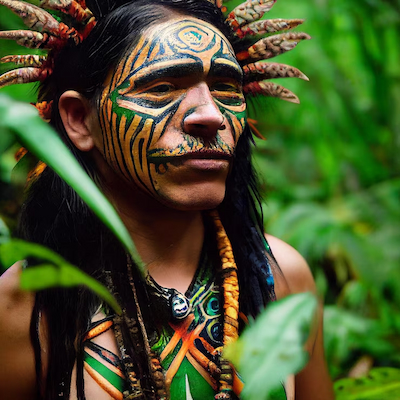
Music plays a fundamental role in Brazilian Indigenous cultures, serving as a link between community members, nature, and the sacred. Since ancient times, musical traditions have been passed down from generation to generation, preserving cultural identity and promoting social cohesion. Songs, dances, and rhythms are authentic expressions of the experiences and worldviews of these peoples, reflecting their beliefs, histories, and their intimate connection with the environment.
In addition to its social character, Indigenous music is full of ritual meanings that go beyond simple entertainment. Each melody and beat has a purpose, whether to celebrate life, honor spirits, heal illnesses, or mark cycles of nature. These musical practices are intrinsic to the lives of Indigenous peoples and play a crucial role in their ceremonies and rituals, being essential for the maintenance of their traditions and values.
How Cultural Expressions Function in Indigenous Communities
Cultural expressions in Indigenous communities function as a complex system that integrates various dimensions of social and spiritual life. Music, in particular, is one of the most visible and impactful forms of expression, serving as a means of communication that transcends verbal language. Each song is loaded with symbolism and meanings that reflect the history and worldview of the people. For example, songs may narrate the creation of the world, the relationship with ancestors, or the importance of natural elements such as water, earth, and fire.
Moreover, music in Indigenous communities is often accompanied by dances and rituals that intensify its social and spiritual function. Dance is not just an artistic expression but also a form of community interaction that strengthens social bonds. During ceremonies, music and dance intertwine, creating an environment conducive to living the rituals, where each movement and note has a deep and specific meaning.
Another important aspect is the transmission of musical knowledge. In Indigenous communities, this transmission is done orally, with elders teaching the younger generation. This process is not limited to the reproduction of songs, but involves understanding the contexts in which they should be performed and the meanings associated with each one. Thus, music becomes a vehicle for cultural education, where new generations learn about their identity and values through lived experience and musical practice.
Finally, cultural expressions in Indigenous communities are dynamic and adapt to social and environmental changes. While many traditions have been preserved over time, Indigenous music also incorporates external influences, creating new forms and styles that reflect contemporary realities. This adaptability is a testament to the cultural resilience of Indigenous peoples, who continue to assert their identity through music, even in the face of external challenges.

Advantages of Understanding Music in Brazilian Indigenous Cultures and Its Ritual Meanings
Understanding music in Brazilian Indigenous cultures and its ritual meanings offers a series of advantages that go beyond simple aesthetic appreciation. First, this understanding promotes greater respect and value for Indigenous cultures, which are often marginalized and misunderstood in contemporary society. By recognizing the depth and complexity of musical traditions, it is possible to build a bridge of dialogue between different cultures, fostering inclusion and mutual respect.
Additionally, Indigenous music is a rich source of knowledge about biodiversity and ancestral wisdom. Many songs are related to sustainable management practices and environmental preservation. By studying these songs, we can learn from Indigenous peoples about the importance of nature and ways of life that respect natural cycles. This wisdom is crucial at a time when we are facing global environmental crises, and music can be a channel to spread this awareness.
Another significant advantage is that Indigenous music can be a powerful tool for healing and well-being. Many musical traditions are linked to healing rituals, where sound is used to restore physical, emotional, and spiritual balance. Understanding these processes can enrich contemporary therapeutic practices, offering new approaches based on ancestral knowledge that values the integration of body, mind, and spirit.
Finally, music in Indigenous cultures is a form of resistance and identity affirmation. By expressing themselves musically, Indigenous peoples reaffirm their presence and history in a world that often attempts to erase them. Understanding and valuing this music is, therefore, a way to support the fight for the preservation of Indigenous cultures and their rights, contributing to a more just and equal future.
How Music in Brazilian Indigenous Cultures and Its Ritual Meanings Manifest
Music in Brazilian Indigenous cultures manifests in various forms, reflecting the richness and diversity of these peoples’ traditions. Among the most common manifestations are ceremonial chants, which are performed in rites of passage, celebrations, and important events. These chants are often accompanied by dances that express a connection with ancestors and natural elements. The lyrics of the songs are often filled with symbolism that narrates stories and transmits teachings.
Another important aspect is the use of traditional musical instruments, which vary according to region and ethnicity. Instruments such as flutes, drums, and maracas are frequently used in rituals and celebrations, each with its specific meaning and function. The crafting of these instruments is also a significant cultural practice, as it involves knowledge of natural materials and manufacturing techniques passed down through generations.
Furthermore, Indigenous music also manifests in everyday contexts, such as agricultural work and festivals. The songs accompanying these activities not only liven up the environment but also strengthen community ties and collective identity. Music is a form of expression that permeates all aspects of Indigenous life, from the most sacred moments to the simplest of daily routines.
Finally, music in Brazilian Indigenous cultures is an element of cultural resistance. In the context of globalization and cultural homogenization, Indigenous peoples use their music as a way to assert their identity and preserve their traditions. This resistance manifests in the reinterpretation of traditional songs and the creation of new compositions that engage with the present, keeping the flame of Indigenous culture alive.
Music is a form of communication that expresses the Indigenous worldview and the relationship with nature.
Musical rituals are moments of celebration and spiritual connection with ancestors.
Traditional instruments are used to create unique sounds that enrich cultural practices.
Songs are transmitted orally, ensuring the continuity of traditions and knowledge.
Music is a form of cultural resistance, affirming Indigenous identity in a transforming world.
Musical practice is a form of cultural education, where elders teach the younger generation about their history and values.
Music in Brazilian Indigenous cultures is a rich and multifaceted manifestation that intertwines with both daily life and sacred rituals. This diversity of musical expressions highlights the importance of music as an essential element in the preservation of Indigenous identity and culture.

Did You Enjoy Learning About Music in Brazilian Indigenous Cultures and Its Ritual Meanings?
Learning about music in Brazilian Indigenous cultures is a valuable opportunity to expand our understanding of the country’s cultural diversity. Through songs and rhythms, we can perceive the richness of traditions and the deep connection these peoples have with nature and the sacred. This experience invites us to value and respect the different forms of cultural expression that exist around us.
Exploring this theme also allows us to reflect on the importance of preserving Indigenous cultures and the role of music as a vehicle for resistance and identity. By delving deeper into this sonic universe, we are contributing to the appreciation and recognition of ancestral knowledge, promoting a more inclusive and respectful future.
Frequently Asked Questions
1. What is the importance of music in Brazilian Indigenous cultures?
Music is very important. It tells stories, transmits traditions, and connects people. It is a means of cultural and spiritual expression.
2. How is music used in Indigenous rituals?
Music accompanies rituals. It may be part of parties, celebrations, and healing ceremonies. Each song has a special purpose.
3. What instruments are common in Indigenous music?
Instruments vary, but common ones include flutes, drums, and maracas. These sounds bring life to the music and rituals.
4. What do the lyrics of Indigenous songs generally talk about?
The lyrics talk about nature, ancestors, and everyday life. They reflect the wisdom and worldview of Indigenous peoples.
5. How does music help preserve Indigenous culture?
Music helps transmit knowledge and stories. In this way, new generations learn about their identity and values. This is fundamental for Indigenous culture.

